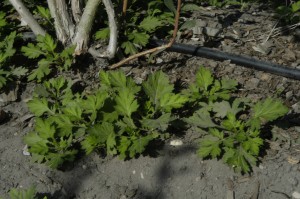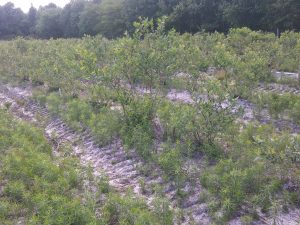
Mugwort in blueberries is also called wild chrysanthemum due to its scent when the leaves are crushed.
The NJDEP informed us last Friday that the 24(c) Special Local Need label for use of Stinger (clopyralid) herbicide in highbush blueberries has been renewed for the 5 years with an expiration date set on December 31, 2025.
This is a really good news for the New Jersey Blueberry Industry as Stinger is a crucial herbicide for control of troublesome perennial weed species that has consistently showed excellent crop safety when used accordingly to the label recommendations. The new updated 24(c) label can be found on the Agrian database (https://www.agrian.com/labelcenter/results.cfm)
Stinger is a PRE and POST herbicide that is strong on weeds in the composite and legume families, such as thistles, asters, dandelion, goldenrod, ragweed, horseweed, clovers, vetch and wild bean. It also controls nightshades, smartweeds, wild buckwheat and plantain.
The maximum labeled rate of Stinger per application 5.3 fluid ounces per acre (0.125 lb acid equivalent/A), and the maximum rate per year application is 10.6 fluid ounces per acre (0.25 lb acid equivalent/A). However, the rate needed varies depending on the target species:
- 2 fl ounces per acre (0.047 lb acid equivalent/A) will control seedling annual weeds such as common ragweed and annual vetch.
- 3 to 4 fluid ounces per acre (0.070 to 0.094 lb acid equivalent/A) are needed to control perennial clover species, horseweed, and groundsel.
- Most other susceptible perennial weeds require the full rate of 5.3 fluid ounces per acre (0.125 lb acid equivalent/A).
Optimum results controlling deep rooted and hard to control perennial weeds, including Canada thistle, perennial asters, goldenrod species, and mugwort (wild chrysanthemum) will be obtained if the Stinger application is split.
Apply Stinger at the rate of 5.3 fluid ounces per acre after blueberry bloom in early to mid-May when the weed is emerging. Some weeds can “survive” for months on established existing foliage even though Stinger suppresses all new growth. Tank-mix with another postemergence herbicide to increase the spectrum of weeds controlled. Be sure to spray adjacent sod and tilled row middles as well as the weed free strip under the blueberries. The application of Stinger timed to match the emergence of the perennial weed in the spring coincides with the time of year when the carbohydrate food reserves in the plant are at the lowest point. Treatment at this time reduces the weed’s chance of recovery and survival.
Apply another 5.3 fluid ounces per acre of Stinger to the marked rows, or sections of rows immediately after harvest in mid-summer. No growth of the target weed may be observed at the time of the second application. Spray the second application even though no growth of the target weed is evident. The second application is essential for the elimination of the hard to kill established perennial weeds. If the second application is skipped, expect to see the weed re-emerge in late August or September. Time all applications to maintain a 30 day PHI (PreHarvest Interval).
Stinger is both a postemergence foliar absorbed herbicide and a residual herbicide. The initial twisting and curling observed after application to susceptible species is due to the foliar absorbtion. Control of established perennials is due to residual Stinger in the soil which prevents re-growth from the roots. In certain species such as mugwort, Stinger prevents re-growth but does not kill the mature leaves. The plant will survive unless another herbicide such as Gramoxone or glyphosate is used to defoliate the plant.

Deep rooted perennials like goldenrod will require multiple Stinger applications.
Stinger can also be used as a wipe treatments by applying a 2% solution of Stinger in water (2.5 fluid ounces per gallon). Make a maximum of two applications with the total usage of Stinger from all types of applications not to exceed 10.6 fl oz per acre or 2/3 pint (0.25 lb acid equivalent/A) per acre per annual growing season.
Do NOT apply Stinger in a hand held sprayer used to “spray until wet”. Stinger is a residual herbicide that must be applied on a rate per acre basis. When treating “patches” of perennial weeds, apply the recommended rate per acre with a calibrated sprayer. Treat ten to fifteen feet beyond the weed “patch” on all sides. Spray the sod or row middles adjacent to the weed “patch” in the row.
Do NOT apply Stinger within 5 hours of expected rainfall or irrigation.
Do NOT permit Stinger to contact desirable foliage
